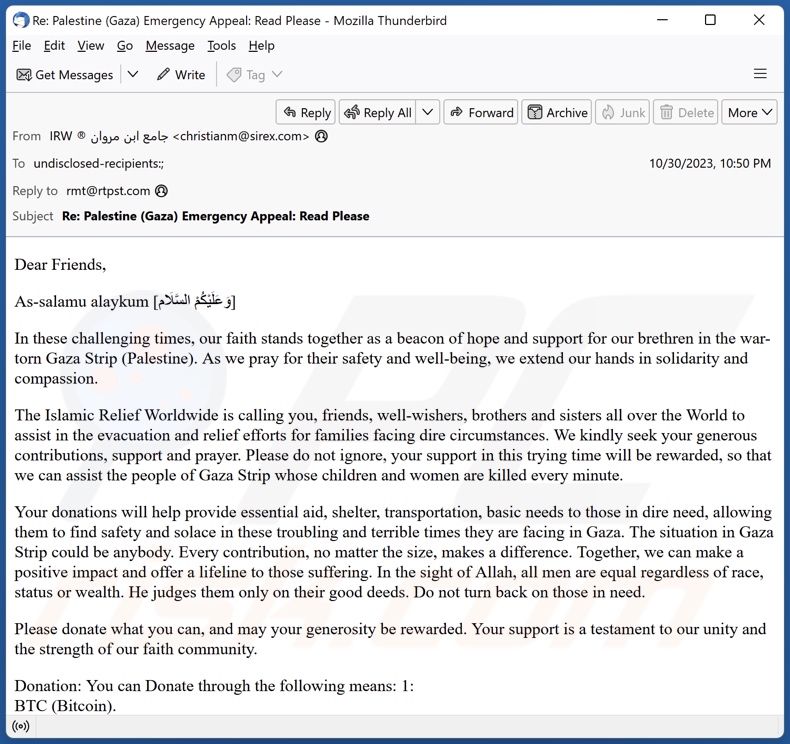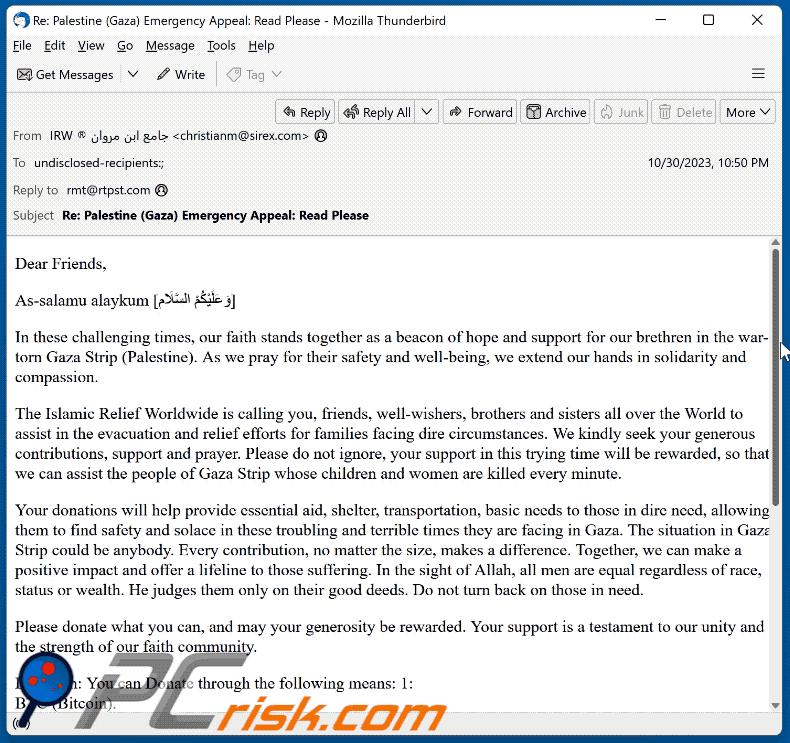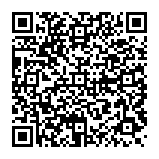Do not trust fake emails seeking donations for the Gaza Strip
![]() Written by Tomas Meskauskas on
Written by Tomas Meskauskas on
What kind of email is "Donations For Gaza Strip"?
The "Donations For Gaza Strip" email is yet another scam that is taking advantage of the ongoing Israel–Hamas war. Scammers behind this spam campaign claim to be seeking donations for the Islamic Relief Worldwide faith-inspired humanitarian and development agency.
It must be emphasized that this is a scam, and it is in no way associated with any legitimate agencies or organizations. Cryptocurrency transferred to the wallet provided in this letter will go to the cyber criminals and not any relief efforts in Palestine.

"Donations For Gaza Strip" email scam overview
The spam email with the subject "Palestine (Gaza) Emergency Appeal: Read Please" (may vary) calls for support to the people in the Gaza Strip. The letter is presented as a plea for donations from the Islamic Relief Worldwide agency. The donated funds will allegedly be used for essential services, such as medical aid, shelter, transportation, and other basic necessities. The donations are to be made in Bitcoin cryptocurrency.
As mentioned in the introduction, this email is fake, and it is not associated with Islamic Relief or any other real individuals or entities. Therefore, all funds transferred to the cryptocurrency wallet listed in this letter will be sent to scammers, not organizations or persons providing humanitarian relief.
Furthermore, due to the virtually untraceable nature of cryptocurrencies – their transactions are practically irreversible, thus victims of this scam will be unable to retrieve their funds.
| Name | "Donations For Gaza Strip" spam email |
| Threat Type | Phishing, Scam, Social Engineering, Fraud |
| Fake Claim | Islamic Relief Worldwide is seeking donations for aid to the Gaza Strip. |
| Disguise | Islamic Relief Worldwide |
| Symptoms | Unauthorized online purchases, changed online account passwords, identity theft, illegal access of the computer. |
| Distribution methods | Deceptive emails, rogue online pop-up ads, search engine poisoning techniques, misspelled domains. |
| Damage | Loss of sensitive private information, monetary loss, identity theft. |
| Malware Removal (Windows) | To eliminate possible malware infections, scan your computer with legitimate antivirus software. Our security researchers recommend using Combo Cleaner. |
Spam campaigns in general
We have examined thousands of spam emails; "PCRF email scam" – is another campaign seeking fake donations to aid Palestine in the 2023 Israel–Hamas war, while "Truist Online Banking Profile", "Increase Your Mail Box Storage Capacity", "INTERNATIONALE SPANISCHE ONLINE-LOTTERIE", "IMAP Termination Process", "Hope And Care", "Funds For Transfer", "American Express Account Confirmation" – are a selection of our newest articles on spam mail.
Scammers commonly incorporate real-world events to further their schemes – wars, armed conflicts, natural disasters, epidemics, etc. – can serve as the backdrop for a variety of scams.
Aside from donation-pleading schemes, other prevalent types include philanthropic efforts, inheritances, lotteries, refunds, service cancellations/renewals, computer/security threat alerts, online account issues, bogus blackmail attempts, and so on. What is more, deceptive emails are also used to proliferate malware.
How do spam campaigns infect computers?
Spam emails/messages can include malicious files as attachments or download links. The files can be documents (e.g., Microsoft Office, Microsoft OneNote, PDF, etc.), executables (.exe, .run, etc.), archives (RAR, ZIP, etc.), JavaScript, and so forth. Once an infectious file is opened – the malware download/installation chain is initiated.
Some formats require additional user interaction to jumpstart system infection processes. For example, Microsoft Office files need users to enable macro commands (i.e., editing/content), while OneNote documents require them to click on embedded links/files.
How to avoid installation of malware?
We strongly recommend exercising caution with incoming emails, PMs/DMs, SMSes, and other messages. Attachments or links present in dubious/irrelevant mail must not be opened, as they can be virulent. We also recommend using post-2010 Microsoft Office versions since their "Protected View" mode prevents automatic macro execution.
It must be mentioned that malware is not distributed exclusively through spam mail. Therefore, we advise being vigilant while browsing since fake and malicious online content typically appears genuine and innocuous.
Furthermore, all downloads must be performed from official and trustworthy sources. Another recommendation is to activate and update programs using functions/tools provided by legitimate developers, as illegal activation tools ("cracks") and third-party updaters may contain malware.
It is paramount to have a reputable anti-virus installed and kept up-to-date. This software must be used to run regular system scans and to remove detected threats and issues. If you've already opened malicious attachments, we recommend running a scan with Combo Cleaner Antivirus for Windows to automatically eliminate infiltrated malware.
Text presented in the "Donations For Gaza Strip" spam email letter:
Subject: Re: Palestine (Gaza) Emergency Appeal: Read Please
Dear Friends,
As-salamu alaykum [وَعَلَيْكُمْ السَّلَام]
In these challenging times, our faith stands together as a beacon of hope and support for our brethren in the war-torn Gaza Strip (Palestine). As we pray for their safety and well-being, we extend our hands in solidarity and compassion.
The Islamic Relief Worldwide is calling you, friends, well-wishers, brothers and sisters all over the World to assist in the evacuation and relief efforts for families facing dire circumstances. We kindly seek your generous contributions, support and prayer. Please do not ignore, your support in this trying time will be rewarded, so that we can assist the people of Gaza Strip whose children and women are killed every minute.
Your donations will help provide essential aid, shelter, transportation, basic needs to those in dire need, allowing them to find safety and solace in these troubling and terrible times they are facing in Gaza. The situation in Gaza Strip could be anybody. Every contribution, no matter the size, makes a difference. Together, we can make a positive impact and offer a lifeline to those suffering. In the sight of Allah, all men are equal regardless of race, status or wealth. He judges them only on their good deeds. Do not turn back on those in need.
Please donate what you can, and may your generosity be rewarded. Your support is a testament to our unity and the strength of our faith community.
Donation: You can Donate through the following means: 1:
BTC (Bitcoin).
You can donate to BTC Wallet /Account: bc1qp5wuc2sku30crrprk9qn7zeackdkr7sfr6uxwy
Note:
If you do not know how to use this process (BTC), you can sign-up here hxxps://www.blockchain.com/. You can fund your account through your Bank.
JazakAllah Khair (May Allah reward you abundantly) for your kindness and compassion.
With prayers and gratitude,
Sheikh Muhammad Ibn Elahi Othman
Ibn Marwan Mosque Tuffah Gaza [جامع ابن مروان]
Sponsored: Islamic Relief Worldwide
Please send us a message to rmt@rtpst.com once you donate so that we will always pray for you.
Appearance of the "Donations For Gaza Strip" email (GIF):

Instant automatic malware removal:
Manual threat removal might be a lengthy and complicated process that requires advanced IT skills. Combo Cleaner is a professional automatic malware removal tool that is recommended to get rid of malware. Download it by clicking the button below:
▼ DOWNLOAD Combo Cleaner
By downloading any software listed on this website you agree to our Privacy Policy and Terms of Use. To use full-featured product, you have to purchase a license for Combo Cleaner. 7 days free trial available. Combo Cleaner is owned and operated by Rcs Lt, the parent company of PCRisk.com read more.
Quick menu:
- What is "Donations For Gaza Strip" spam email?
- Types of malicious emails.
- How to spot a malicious email?
- What to do if you fell for an email scam?
Types of malicious emails:
![]() Phishing Emails
Phishing Emails
Most commonly, cybercriminals use deceptive emails to trick Internet users into giving away their sensitive private information, for example, login information for various online services, email accounts, or online banking information.
Such attacks are called phishing. In a phishing attack, cybercriminals usually send an email message with some popular service logo (for example, Microsoft, DHL, Amazon, Netflix), create urgency (wrong shipping address, expired password, etc.), and place a link which they hope their potential victims will click on.
After clicking the link presented in such email message, victims are redirected to a fake website that looks identical or extremely similar to the original one. Victims are then asked to enter their password, credit card details, or some other information that gets stolen by cybercriminals.
![]() Emails with Malicious Attachments
Emails with Malicious Attachments
Another popular attack vector is email spam with malicious attachments that infect users' computers with malware. Malicious attachments usually carry trojans that are capable of stealing passwords, banking information, and other sensitive information.
In such attacks, cybercriminals' main goal is to trick their potential victims into opening an infected email attachment. To achieve this goal, email messages usually talk about recently received invoices, faxes, or voice messages.
If a potential victim falls for the lure and opens the attachment, their computers get infected, and cybercriminals can collect a lot of sensitive information.
While it's a more complicated method to steal personal information (spam filters and antivirus programs usually detect such attempts), if successful, cybercriminals can get a much wider array of data and can collect information for a long period of time.
![]() Sextortion Emails
Sextortion Emails
This is a type of phishing. In this case, users receive an email claiming that a cybercriminal could access the webcam of the potential victim and has a video recording of one's masturbation.
To get rid of the video, victims are asked to pay a ransom (usually using Bitcoin or another cryptocurrency). Nevertheless, all of these claims are false - users who receive such emails should ignore and delete them.
How to spot a malicious email?
While cyber criminals try to make their lure emails look trustworthy, here are some things that you should look for when trying to spot a phishing email:
- Check the sender's ("from") email address: Hover your mouse over the "from" address and check if it's legitimate. For example, if you received an email from Microsoft, be sure to check if the email address is @microsoft.com and not something suspicious like @m1crosoft.com, @microsfot.com, @account-security-noreply.com, etc.
- Check for generic greetings: If the greeting in the email is "Dear user", "Dear @youremail.com", "Dear valued customer", this should raise suspiciousness. Most commonly, companies call you by your name. Lack of this information could signal a phishing attempt.
- Check the links in the email: Hover your mouse over the link presented in the email, if the link that appears seems suspicious, don't click it. For example, if you received an email from Microsoft and the link in the email shows that it will go to firebasestorage.googleapis.com/v0... you shouldn't trust it. It's best not to click any links in the emails but to visit the company website that sent you the email in the first place.
- Don't blindly trust email attachments: Most commonly, legitimate companies will ask you to log in to their website and to view any documents there; if you received an email with an attachment, it's a good idea to scan it with an antivirus application. Infected email attachments are a common attack vector used by cybercriminals.
To minimise the risk of opening phishing and malicious emails we recommend using Combo Cleaner Antivirus for Windows.
Example of a spam email:

What to do if you fell for an email scam?
- If you clicked on a link in a phishing email and entered your password - be sure to change your password as soon as possible. Usually, cybercriminals collect stolen credentials and then sell them to other groups that use them for malicious purposes. If you change your password in a timely manner, there's a chance that criminals won't have enough time to do any damage.
- If you entered your credit card information - contact your bank as soon as possible and explain the situation. There's a good chance that you will need to cancel your compromised credit card and get a new one.
- If you see any signs of identity theft - you should immediately contact the Federal Trade Commission. This institution will collect information about your situation and create a personal recovery plan.
- If you opened a malicious attachment - your computer is probably infected, you should scan it with a reputable antivirus application. For this purpose, we recommend using Combo Cleaner Antivirus for Windows.
- Help other Internet users - report phishing emails to Anti-Phishing Working Group, FBI’s Internet Crime Complaint Center, National Fraud Information Center and U.S. Department of Justice.
Frequently Asked Questions (FAQ)
Why did I receive this email?
Spam emails are not personal. Cyber criminals distribute this mail in massive campaigns – therefore, thousands of users receive identical messages.
I have sent cryptocurrency to the address presented in this email, can I get my money back?
No, cryptocurrency transfers are considered irreversible since their transactions are virtually untraceable.
I have read a spam email but didn't open the attachment, is my computer infected?
No, merely reading an email will not trigger any malware download/installation processes. Devices are infected when malicious attachments or links are opened.
I have downloaded and opened a file attached to a spam email, is my computer infected?
Whether your device was compromised might depend on the opened file's format. If it was an executable (.exe, .run, etc.) – most likely, yes – these files cause infections almost without fail. However, you might have avoided this if it was a document (.doc, .xls, .pdf, etc.). These formats can require extra actions to begin malware download/installation chains (e.g., enabling macro commands, clicking embedded content, etc.).
Will Combo Cleaner remove malware infections present in email attachments?
Yes, Combo Cleaner is designed to remove all manner of threats. It can detect and eliminate most of the known malware infections. Keep in mind that performing a complete system scan is essential since sophisticated malicious software typically hides deep within systems.


▼ Show Discussion